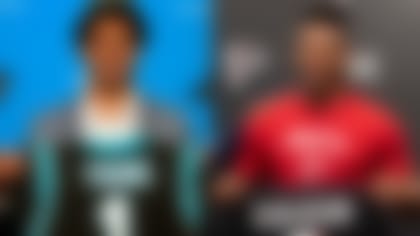Why provide instant grades on the selections of prospects who have yet to take an NFL snap? Well, you're reading this, aren't you? Considering the makeup of every roster and the factors surrounding each pick, Eric Edholm executes a division-by-division assessment of the 2023 NFL Draft. Keep in mind that these grades are based on draft hauls alone -- picks traded for veteran players were not taken into account. Below is the AFC North report card.
Round 1
- Georgia OT Broderick Jones (No. 14 overall)
Round 2
- Penn State CB Joey Porter Jr. (No. 32)
- Wisconsin DT Keeanu Benton (No. 49)
Round 3
- Georgia TE Darnell Washington (No. 93)
Round 4
- Wisconsin edge Nick Herbig (No. 132)
Round 7
- Purdue CB Cory Trice Jr. (No. 241)
- Maryland OL Spencer Anderson (No. 251)
I had listed offensive line, cornerback and defensive line -- in that order -- as the Steelers' biggest needs coming into the draft. Perhaps that's just how the board ultimately lined up, but it's also exactly the way Pittsburgh spent its first three picks. Moving up three spots to draft Broderick Jones not only appeared to snipe him from the Jets but also gave the Steelers a young, ascending talent with plus athleticism to groom as the left tackle of the future -- perhaps as soon as Week 1. Jones offers an enticing combination of length, athleticism and natural power. If he plays with a bit more control, he can be a Pro Bowl player. Joey Porter Jr. certainly made sense from a feel-good perspective, but this wasn't just a nostalgic legacy pick. The younger Porter is a long, lean and highly athletic press corner who cleaned up his tackling and made more plays on the ball last season. His technique could still use a quality car wash, but this was the type of talent Pittsburgh needed at a short-handed position. Keeanu Benton likely made a live pre-draft impression on Mike Tomlin, who was an up-close viewer of Senior Bowl one-on-ones -- drills that made Benton money. He's a thickly built, tenacious rusher with surprising flexibility and length who should contend for steady rookie snaps. Darnell Washington reportedly fell because of some injury concerns, but the massive Georgia product could be a nice fit in Pittsburgh, which can operate in more two-TE sets once this third-round pick is acclimated. His length and athleticism can add another dimension to the offense. The Steelers love their family connections, which didn't end with Porter. Nick Herbig joins big brother Nate and could carve out a role as a pass-rush specialist and special teamer with his relentless style. Cory Trice Jr. adds even more length and athleticism to the secondary, and he easily could have gone 100 picks earlier, so there's a path to making the initial 53-man roster. Spencer Anderson has guard and tackle experience, but might face longer odds to make the team at first.
Round 1
- Boston College WR Zay Flowers (No. 22 overall)
Round 3
- Clemson LB Trenton Simpson (No. 86)
Round 4
- Mississippi edge Tavius Robinson (No. 124)
Round 5
- Stanford CB Kyu Blu Kelly (No. 157)
Round 6
- Oregon OL Malaesala Aumavae-Laulu (No. 199)
Round 7
- USC OG Andrew Vorhees (No. 229)
With Lamar Jackson agreeing to a five-year extension hours before the draft began, last week was already deemed a success for the Ravens before they'd even made a single pick. That had to streamline the process significantly for GM Eric DeCosta and the rest of the front office to attack the trouble spots on the roster, which once again is that of a contender now that the QB1's officially on board. I thought Baltimore might go with Maryland CB Deonte Banks at No. 22 overall, considering the need, but had no problem whatsoever with the selection of Zay Flowers. In fact, Flowers was my WR2 in this draft class, ranked 18th regardless of position. I love his shifty playmaking skills, which -- dare I say -- remind me somewhat of vintage Antonio Brown. I think the "Ravens can't draft receivers" talk is due to subside once Flowers gets going, likely as a slot weapon. Baltimore always does a nice job of marrying short-term need, long-term vision and draft value, and the Trenton Simpson pick was a reflection of that. The highly athletic linebacker wasn't my favorite player to scout, but he was absolutely worth the No. 86 overall pick and could play a number of roles in time, assuming Simpson can't beat out Patrick Queen at some point this season. Tavius Robinson has taken a fascinating path to where he is now and looks like the kind of long, somewhat-twitchy rush end the Ravens like to target and groom over time. Kyu Blu Kelly has decent length, NFL bloodlines (son of former Bucs DB Brian Kelly) and is mature enough to crack the CB rotation early in his career. The final two picks were long-term investments in the offensive line. Malaesala "Sala" Aumavae-Laulu has plenty to clean up in an unrefined game, but boasts power and length and could be tried as a tackle or guard. Baltimore traded back into the draft to take Andrew Vorhees, who suffered a torn ACL at the NFL Scouting Combine but came back the next day to bang out a class-best 38 reps on the bench press. He's a 2024 player, most likely, but can add experience, versatility, grit, toughness and smarts to the room when healthy.
Round 1
- Clemson edge Myles Murphy (No. 28 overall)
Round 2
- Michigan CB DJ Turner II (No. 60)
Round 3
- Alabama S Jordan Battle (No. 95)
Round 4
- Purdue WR Charlie Jones (No. 131)
Round 5
- Illinois RB Chase Brown (No. 163)
Round 6
- Princeton WR Andrei Iosivas (No. 206)
- Michigan P Brad Robbins (No. 217)
Round 7
- Miami CB D.J. Ivey (No. 246)
The pass rush was an area that needed a little bolstering, so grabbing Myles Murphy near the end of Round 1 felt like a solid play. Murphy can spell Trey Hendrickson and Sam Hubbard and also join them on a third-down package that floods quarterbacks with three or four pass rushers on the field together. Bottom line: No one's expecting Murphy to be a Day 1 starter here, but his length, mass and athleticism will be used right away. There might be somewhat-similar expectations for Cincinnati's next four picks, to varying degrees. DJ Turner II should be expected to contribute right away, but likely won't crack the top three CB spots. Turner's speed (combine-best 4.26 40-yard dash) and short-area quickness make him a natural slot option, perhaps as Mike Hilton's eventual replacement. The Jordan Battle pick was a bit of a surprise, given Cincy's depth at safety, but I'm not betting against him pushing Nick Scott for a job eventually. Charlie Jones might be the team's starting punt and kick returner, could beat out Trenton Irwin for WR4 duties and might eventually replace Tyler Boyd, who is in the final year of his deal. As of now, Joe Mixon is on the roster and the presumed starter -- until he isn't. But Chase Brown absolutely cannot be counted out of this year's RB rotation, not with Samaje Perine gone and Mixon's status unclear amid his off-field legal issues. Brown was a workhorse for the Illini, but in the NFL, he might be best in a change-of-pace or third-down role. Andrei Iosivas has more deep speed than Jones but is less polished all around and might need a redshirt year. A sixth-round pick at punter, Brad Robbins figures to have a better chance to win the job than incumbent Drue Chrisman because of his hangtime, bad-weather experience and FG-holding ability. Seventh-rounder D.J. Ivey was a height-weight gamble late who finally developed in his last year at Miami.
Round 3
- Tennessee WR Cedric Tillman (No. 74 overall)
- Baylor DT Siaki Ika (No. 98)
Round 4
- Ohio State OT Dawand Jones (No. 111)
- Missouri edge Isaiah McGuire (No. 126)
Round 5
- UCLA QB Dorian Thompson-Robinson (No. 140)
- Northwestern CB Cameron Mitchell (No. 142)
Round 6
- Ohio State C Luke Wypler (No. 190)
The Browns had to sit on their hands for two-plus rounds, but once they got into the draft, they didn't waste time finding talent. Cedric Tillman likely would have gone at least a round higher if injuries hadn't significantly impacted his senior campaign at Tennessee; the 12-touchdown season in 2021 was quite impressive. There is a track toward a starting role in Cleveland if Tillman can add more subtlety to his routes, adjust to this new offense and stay healthy. There's no reason why Siaki Ika can't compete for regular snaps right away. The Browns have been bullied up front by opposing run games for a minute now, and Ika's strength is, well, his strength. The 6-foot-3, 335-pounder can really root down in the trenches. Even as the league has gotten away from this type of nose tackle somewhat, the value of getting him at No. 98 felt very good. The Browns then added more beef in Round 4 with two players who also could have cracked Day 2 in Dawand Jones and Isaiah McGuire. Jones is in good hands with OL coach Bill Callahan. The 6-8, 374-pounder has the mass, strength and length to be a people mover at right tackle or guard. McGuire has the frame to back up Myles Garrett and rotate in up front, especially with 2022 third-rounder Alex Wright still somewhat of an unknown quantity. The Browns have an overloaded QB room with four guys right now, but they could absolutely keep three if Dorian Thompson-Robinson impresses this summer. He's experienced, athletically gifted and showed tangible strides the past few years -- a good match, skill-wise, behind Deshaun Watson and Joshua Dobbs. Fifth-round CB Cameron Mitchell joins former Northwestern teammate (and friend since grade school) Greg Newsome II. Mitchell isn't big, but he has a good feel for coverage and route recognition. That said, he could stand to make plays on the ball more consistently. Luke Wypler might be a center-only prospect, but has the toughness and smarts to be groomed as a rookie before potentially vying for the starting job down the road.
Follow Eric Edholm on Twitter.
















